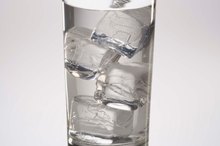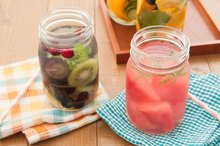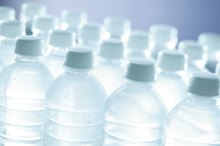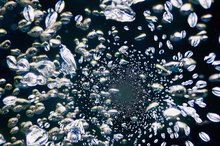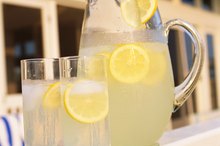Vitamin Water Health Facts
Bottled water is the second most purchased type of drink in the United States, just behind carbonated sodas, according to the U.S. Food and Drug Administration. Vitamin water falls into the bottled water category. As more Americans embark on a healthy lifestyle, there is an increased interest in health drinks such as vitamin water. The health benefits of vitamin water don’t compare to plain water. In some cases, vitamin water can wreak havoc on your diet and are potentially dangerous for children.
Vitamin Water Ingredients
Vitamin water is composed of fortified vitamins as well as other ingredients for taste. These include syrups, sweeteners and flavors that mimic the taste of some fruits. Some types of vitamin water also contain caffeine, so it is important that you read all product labels carefully. KidsHealth.org warns against using vitamin water with herbal ingredients, especially in children. The FDA requires bottled water manufacturers to list all product ingredients.
- Vitamin water is composed of fortified vitamins as well as other ingredients for taste.
- Some types of vitamin water also contain caffeine, so it is important that you read all product labels carefully.
Purported Effects of Vitamin Water
Is Too Much Vitamin Water Bad for You?
Learn More
The effects of vitamin water vary, depending on the type of water you choose. The vitamins in these bottled waters are designed to replenish your body with certain nutrients that you lack. This may be especially important after exercising or if you are on a low-calorie diet. If you are used to drinking sodas or juices as your main beverages, then switching to vitamin water gives you a lower calorie option. Plus, you can still enjoy a taste of sweetness. You might experience some initial weight loss if you switch to lower calorie beverages. According to the Vitamin Water website, there are 120 calories in a 20 ounce serving of vitamin water.
- The effects of vitamin water vary, depending on the type of water you choose.
- If you are used to drinking sodas or juices as your main beverages, then switching to vitamin water gives you a lower calorie option.
Misconceptions About Vitamin Water
Vitamin water is sometimes marketed as a drink to complement a weight loss regime. Unfortunately the opposite effect can occur, particularly if you choose vitamin water that has added sugar, carbohydrates and calories. Even no-calorie vitamin water may not be healthy, due to the artificial sweeteners added for taste. Some brands of vitamin water are made with sucralose and aspartame, which can cause gastrointestinal side effects such as nausea and diarrhea when consumed too often according to a report from Yale-New Haven Hospital.
- Vitamin water is sometimes marketed as a drink to complement a weight loss regime.
- Unfortunately the opposite effect can occur, particularly if you choose vitamin water that has added sugar, carbohydrates and calories.
Alternatives to Vitamin Water
Life Water Vs. Vitamin Water
Learn More
Plain water is the healthiest drink available. Aside from flushing out your system, water assists in nutrient transportation within the body. The health benefits of plain water outweigh those of vitamin water, when you drink in conjunction with eating a balanced diet. The taste of plain water is one of the most common reasons why people have an aversion to it. Add a splash of your favorite juice or lemon to the water to help give it more flavor. If you are worried that you do not get enough vitamins from your diet, ask your doctor about taking a daily multivitamin.
- Plain water is the healthiest drink available.
- The health benefits of plain water outweigh those of vitamin water, when you drink in conjunction with eating a balanced diet.
Related Articles
References
- Food and Drug Administration: FDA Regulates the Safety of Bottled Water Beverages Including Flavored Water and Nutrient-Added Water Beverages
- KidsHealth.org: Power Drinks: Should Your Child Drink Them?
- Nutrients: Vitamin Enhanced Waters nd Polyphenol Rich Beverages Analyzed for Antioxidant Capacity and Antioxidants/Calorie
- Rosario-Ortiz F, Rose J, Speight V, Von Gunten U, Schnoor J. How do you like your tap water?. Science. 2016;351(6276):912-914. doi:10.1126/science.aaf0953
- National Resource Defense Council. Bottled water: Pure drink or pure hype?. Updated February 1999.
- Centers for Disease Control and Prevention. Bottled water. Basics. Updated April 2014.
- Centers for Disease Control and Prevention. Camping, hiking, travel. Updated February 2018.
- Kim SK, Park SW, Kang SM, Kwon HK, Kim BI. Assessment of the erosive potential of carbonated waters. J Korean Acad Oral Health. 2015;39(4):273-279. doi:10.11149/jkaoh.2015.39.4.273
- Quattrini S, Pampaloni B, Brandi ML. Natural mineral waters: chemical characteristics and health effects. Clin Cases Miner Bone Metab. 2016;13(3):173-180. doi:10.11138/ccmbm/2016.13.3.173
- James LJ, Mattin L, Aldiss P, Adebishi R, Hobson RM. Effect of whey protein isolate on rehydration after exercise. Amino Acids. 2014;46(5):1217-1224. doi:10.1007/s00726-014-1680-8
- Fleming N, Vaughan J, Feeback M. Ingestion of oxygenated water enhances lactate clearance kinetics in trained runners. J Int Soc Sports Nutr. 2017;14(1):9. doi:10.1186/s12970-017-0166-y
- Cleveland Clinic. Electrolyte drinks: Beneficial or not?. Updated April 2019.
- Li L, Seeram NP. Further investigation into maple syrup yields 3 new lignans, a new phenylpropanoid, and 26 other phytochemicals. J Agric Food Chem. 2011;59(14):7708-7716. doi:10.1021/jf2011613
- Kalman DS, Feldman S, Krieger DR, Bloomer RJ. Comparison of coconut water and a carbohydrate-electrolyte sport drink on measures of hydration and physical performance in exercise-trained men. J Int Soc Sports Nutr. 2012;9(1):1. doi:10.1186/1550-2783-9-1
- Cleveland Clinic. Alkaline water: Don’t believe the marketing hype. Updated October 2013.
- Weidman J, Holsworth RE, Brossman B, Cho DJ, Cyr JS, Fridman G. Effect of electrolyzed high-pH alkaline water on blood viscosity in healthy adults. J Int Soc Sports Nutr. 2016 Dec 1;13(1):45. doi:10.1186/s12970-016-0153-8
- Mumme K, Stonehouse W. Effects of medium-chain triglycerides on weight loss and body composition: a meta-analysis of randomized controlled trials. J Acad Nutr Diet. 2015;115(2):249-263. doi:10.1016/j.jand.2014.10.022
- Cleveland Clinic. Hydration. Updated May 2019.
Resources
Writer Bio
Kristeen Cherney began writing healthy lifestyle and education articles in 2008. Since then, her work has appeared in various online publications, including Healthline.com, Ideallhealth.com and FindCollegeInfo.com. Cherney holds a Bachelor of Arts in communication from Florida Gulf Coast University and is currently pursuing a Master of Arts in English.
